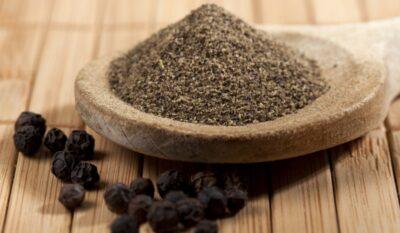Black pepper is a common staple on kitchen counters and on dining room tables. Native to southern India, black pepper (Piper nigrum) is actually a flowering vine cultivated and harvested for its fruit, which is known as peppercorn. When dried, this fruit (technically a “drupe”) is about five mm in diameter, is dark red when mature, and contains a single large seed at its center. Peppercorns, and the ground powder derived from them, have been used for centuries as a seasoning spice and as a traditional medicine throughout the world.
The Tellicherry black pepper is the most popular variety, and is named after the Thalassery port on the Malabar Coast of Kerala, India. The Tellicherry peppercorn is larger and darker than other varieties and has a more complex flavor.
If pepper has been just something you shake into certain recipes or on certain foods for its added zest, you may want to know that this familiar seasoning has many other uses and benefits. Let’s look at some of them:
1. Ant deterrent. Have ants taken over your garden? Ditch the harsh chemicals and instead try pouring about a half-cup of black pepper down the ant hole to get rid of the annoying invaders. You can also keep ants out of your kitchen by sprinkling black pepper wherever you have seen them. Be sure to target points of entry such as windowsills or floor cracks.
2. Garden insect help. Another way to use pepper to cut down on nibbling garden insects is to mix equal parts of black pepper with flour. Sprinkle the mixture around your plants to keep bugs at bay.
3. Animal control. If larger pests such as deer are the problem in your garden, pepper can also help. Blend together the following ingredients until smooth:
- 2 tbsp. black or cayenne pepper
- 2 cloves of garlic
- 4 medium onions
- 4 cups water
Mix well with about a gallon of water and spray your plants with the solution.
4. Fix leaky radiator. If your car radiator is leaky and you need some time to get it to the shop, try pouring some black pepper into it – even an entire shaker. The pepper will temporarily plug up tiny holes until you can get the radiator repaired or replaced. (Note: This will not work on major leaks.)
5. Laundry detergent booster. Adding a teaspoon of black pepper to your wash will help keep the colors of your clothing, sheets and towels bright. Pepper also can help prevent your laundry colors from bleeding or running.
6. Earache soother. Did you know that black pepper can help ease the pain of earaches in adults? Simply sprinkle ground black pepper onto a cotton ball. Then gently place the cotton ball into the outer ear area for relief.
7. Expectorant. Black pepper is useful for treating common respiratory conditions, such as a cough associated with a cold, due to its anti-inflammatory properties. Pepper’s natural irritant quality helps you to expel mucous and phlegm through the act of sneezing or coughing.
The Hidden Secrets Of Making Herbal Medicines…Right At Your Fingertips!
8. Cognitive health. Piperine, which is found in black pepper, may help reduce memory impairment and cognitive malfunction. Research shows that the brain’s chemical pathways are stimulated by the organic compound.
9. Antibacterial properties. Black pepper’s antibacterial properties help the body fight infections. In addition, pepper in your diet can help keep your arteries clean by working to scrape excess cholesterol from the artery walls, and thereby reducing the likelihood of atherosclerosis, the condition that contributes to heart attacks and strokes.
10. Skin benefits. Black pepper helps to cure “vitiligo,” a skin disorder that causes some areas of skin to lose its normal pigmentation and turn white. According to recent research, the piperine in pepper can stimulate the skin to produce more pigment.
It is black pepper’s antibacterial properties that make it useful as a food preservative. Pepper also is a rich source of iron, manganese, potassium, dietary fiber, Vitamin C and Vitamin K. Black pepper also works as an anti-inflammatory agent.
As you might expect, freshly ground black pepper retains more of these useful properties than does store-bought ground pepper. Even home-ground pepper will only retain optimal freshness for about three months. According to an article in Cook’s Illustrated magazine, “once the hard, black shell of the pepper corn is cracked open, its aroma immediately stars to fade, and most of its flavor and scent disappear within a half hour.”
Whole black peppercorns, however, keep their freshness indefinitely, so purchasing a pepper grinder or pepper mill is a great investment. Many spice companies sell black peppercorn in a glass bottle with an attached grinder, so this is another option.
As we all know, black pepper may induce sneezing. If you have had abdominal surgery, do not add black pepper to your diet. Also, it’s a good idea to avoid adding black pepper to your diet in high concentrations.
What other uses have you found for black pepper? Share your tips in the section below:
 Off The Grid News Better Ideas For Off The Grid Living
Off The Grid News Better Ideas For Off The Grid Living





